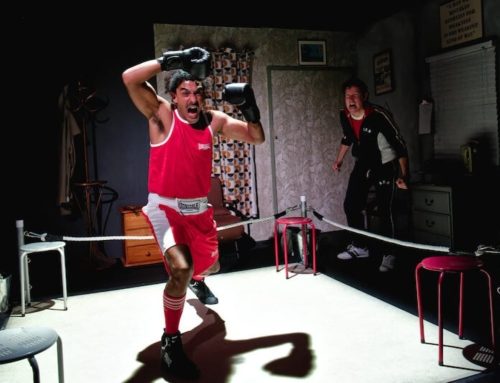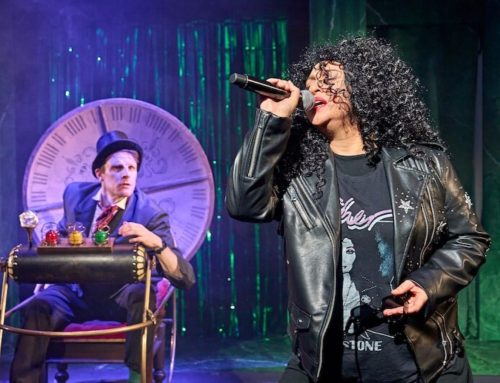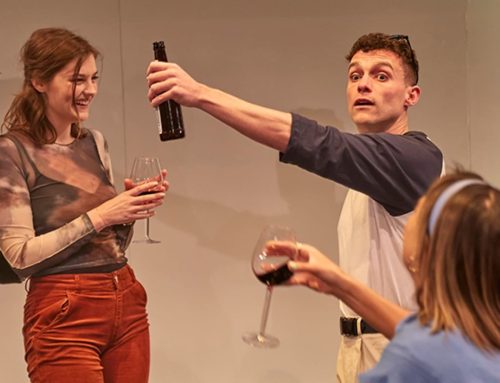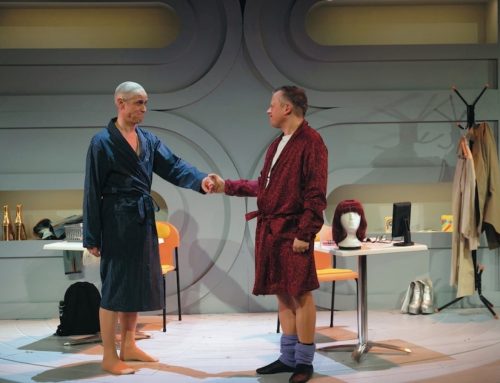“The world exists, stories get made up,” says Elisabeth Demand, the protagonist of Ali Smith’s Booker-prize shortlisted novel Autumn, adapted for the Park Theatre stage by Harry McDonald. But there is a feeling in the slow-burning piece, which moves more-or-less smoothly between past and present, memory and dream, that the way we see the world gets made up too. What is recalled and forgotten can be a function of personal and cultural whim. What is valued or disregarded reflects historical chance as much as intrinsic worth.
The question Smith poses is what can we truly rely on in navigating an impermanent, fragmented world? Love, art, and friendship are the solutions Autumn, directed by Charlotte Vickers, offers. The message is kind and inclusive and the piece certainly looks good. Ultimately though it simmers gently but never quite springs fully to life.
It is 2016. Britain has just voted to leave the European Union. Thirty-something art history lecturer Elisabeth (Rebecca Banatvala) comes home to spend the summer in the village where she grew up. It is six years since Elisabeth visited and her mum Wendy (Sophie Ward) is unsurprisingly a tad peeved.
For many in the village, Brexit divisions are still raw. “The liars have let it happen” moans Wendy who is tired of life and angry. Turmoil is in the air. Someone is scrawling “go home” on houses belonging to European immigrants. The sea is eating away at the coastline. Mysterious fences are being put up, guarded by a threatening security guard (Nancy Crane takes a host of small roles). Most annoying of all, the local post office refuses to process Elisabeth’s passport application because the photo is a millimetre or so too big. “This isn’t fiction, this is the post office” the jobsworth postal clerk informs her, a hint that love, art, and friendship may be no match for bureaucracy.
Elisabeth takes to visiting her 101-year-old former next-door neighbour and childhood best friend Daniel (Gary Lilburn). He lies asleep and close to death in a local care home. “The increased sleep thing comes when people are more final,” the cleaner says, and one supposes she has seen it before. Elisabeth finds comfort in reading A Tale Of Two Cities aloud and reflecting, in a series of flashbacks to childhood, on how the friendship between the duo emerged. “Why are you always hanging around an old gay man?” Mum asks a young Elisabeth, whose memories of her friend brim with art, music, theatre, and storytelling. “He’s not gay, he’s European” is the teen’s pithy response, one which hints at the character’s sexually fluid future.
Meanwhile, a second narrative strand sees us enter songwriter Daniel’s dreamscape as he reflects on ten decades of life. Events track shifting encounters with a younger sister (lost to wartime brutality), the long-forgotten British pop artist Pauline Boty (Rebecca Banatvala again), and 60s’ femme fatale Christine Keeler. Mortality is calling on Daniel and he may choose not to wake up. Add into the mix a subplot that sees Mum find a surprising new object for long-hidden romantic yearnings.
The play’s sum of parts is aided by a solid central performance from Banatvala as the kind, meditative, introverted Elisabeth. Lilburn’s Daniel may be a little too Forest Gumpish for some tastes but delivers an appealingly wistful hint of magical realism in his determination to invent stories, or “bagatelles” as he labels them. Crane’s turn as psychoanalyst Zoe showcases her skills best. Ward’s Wendy, suspicious of Daniel at first, then happy to use him as a cheap childminder, oozes outspoken rural eccentricity.
McDonald’s writing has momentum and Vicker’s direction bubbles gently although, like a November Sunday afternoon, Autumn can sometimes feel a tad too leisurely. The piece never quite comes alive on the stage, largely because it feels so absent of conflict. The antagonistic forces – time, mortality, cultural amnesia and social division – lack personal form and struggle to emerge recognisably from the fog of multiple time shifts. Lacking much dramatic conflict what remains in the piece are decent, kind people trying to make sense of bittersweet memories. Autumn has a message (“It’s OK to forget” a character tells us) but one yearns for a bit more theatrical bite.
Writer: Harry McDonald (adapted from the novel by Ali Smith)
Director: Charlotte Vickers
More Recent Reviews
Playfight. Soho Theatre.
Writer Julia Grogan’s breathtakingly assured debut play arrives at Soho Theatre following stellar reviews at the Edinburgh Fringe and [...]
All The Happy Things. Soho Theatre.
Naomi Denny’s three-hander comedy-drama All The Happy Things covers familiar themes within a recognisable premise. A grieving protagonist comes [...]
Telly. Bread and Roses Theatre.
The challenge with absurdist comedy is that many people do not find it funny. Laughing at the sheer weirdness [...]






